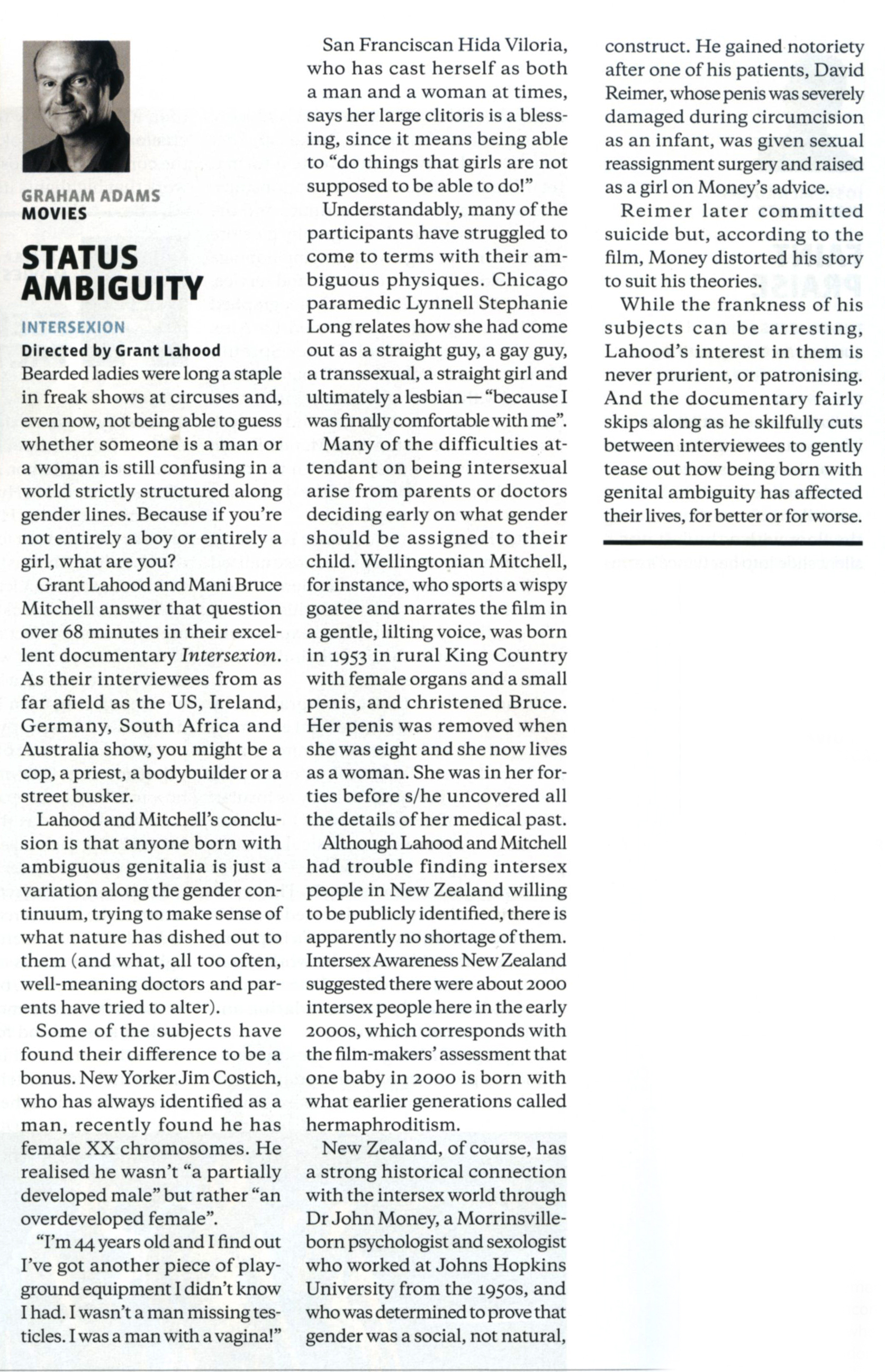Intersexion





Reviewed by: Jennie Kermode
EYE FOR FILM. UK.
Why is it that, when forms ask “Are you male or female?”, there’s never a box for “No”?
Perhaps it doesn’t seem like this should matter. You might think everybody is one or the other; or that those who blur the boundaries are vanishingly few in number. You’d be wrong on both counts. Even the most conservative estimates suggest there are millions of intersex people out there. Some of them may be your friends. Why can’t you tell? Well, because most such people have been taught that a failure to ‘pass’ as male or female (and, preferably, identify that way) would mean instant social exclusion and possibly violence. Shame is the order of the day – such shame that, historically, it has been routine practice to erase case records so that nobody knows such possibilities exist.
This documentary aims to set the record straight. Carefully navigating related politics and sticking to a consensus approach, it outlines the protocols that have ben used in recent history to manage the existence of socially challenging bodies. It talks about the huge variety of intersex variations, some of which are obvious at birth whilst others are only diagnosed later in life, if at all. It talks about the surgeries still commonly performed on intersex babies with the purported aim of helping them ‘fit in’, often leaving them devoid of sexual sensation for the rest of their lives. The other medical problems that often stem from such treatments, and the particular health risks facing intersex people more generally, are underexplored, but that’s forgiveable given the considerable amount of information on other issues the film packs into its running time. It may also be an artefact of a decision to eschew some of the grimmest stuff in favour of an approach that highlights the positives in at least some of its subjects’ lives – for the many intersex people who feel isolated, this will prove an inspiring piece of work, showing that being born different need not inevitably lead to inescapable suffering.
Given that many viewers of this film will be learning about intersex issues for the first time, it has to balance providing a solid overview of the basics with engaging an uncertain audience and respecting its subjects. This is something it does very well, largely thanks to a series of strong interviews with charismatic individuals whose personal stories combine into a complex whole. Issues of gender identity – those who feel male, female or neither – are explored with such simplicity and honesty that they are unlikely to alienate viewers. The film challenges conventional notions about what makes a ‘real’ man or woman, and also looks at prejudices and expectations around sexual orientation that have contribued to the identities imposed on many intersex people from outside. Reference is made to famous cases that call into question the notion of gender as an entirely social phenomenon, and several of the film’s participants enthuse about their lives in San Francisco, a city whose liberal attitudes make life far easier.
There are some horrific stories here, and those who have been subject to unwanted surgeries themselves will find parts of it hard to watch. Anyone who has supported campaigns against female genital mutilation will be left wondering why countries that condemn it still allow this sort of thing to go on. Others will wonder simply how such a big issue has been hidden for so long. Intersexion is a vital film not only in bringing it to public view, but in doing so primarily through the stories of intersex people themselves – people tired of being squeezed out of society, now setting their own agenda. Not just a footnote on an already crowded equalities agenda, but part of the world like anybody else.
Reviewed on: 22 Feb 2013
Intersexion is an incredibly powerful and informative documentary about intersexuality that deserves to be widely seen in communities, classrooms and healthcare institutions around the world. We programmed the film at the Syracuse University Human Rights Film Festival where the response to the film from students, faculty and local community members was overwhelming. The documentary bears witness not only to the traumatic history of intersex suffering at the hands of medical science, but also to the power of community formation and mobilization as intersex activism has challenged the pathologization, physical mutilation and disempowerment perpetrated in the name of science and social conformity. When I subsequently discussed the film in my LGBT studies class, students revealed how the documentary prompted them to completely rethink their binaristic conceptions of gender and sex. This film will undoubtedly become a major resource for activist mobilization and teaching gender and sexuality for many years to come.
Roger Hallas
Associate Professor English
Director, Lesbian, Gay, Bisexual and Transgender Studies Program
Syracuse University

